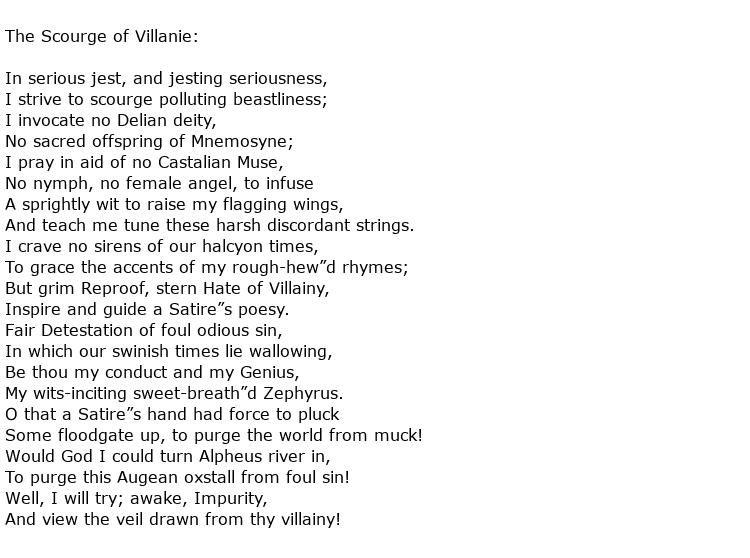 John Marston was a quirky poet, priest and playwright from England whose work spanned both the Elizabethan and Jacobean eras. He was known for his satirical style of writing although, on occasions, his writing pushed the boundaries of acceptability and he found himself in trouble with the authorities.
John Marston was a quirky poet, priest and playwright from England whose work spanned both the Elizabethan and Jacobean eras. He was known for his satirical style of writing although, on occasions, his writing pushed the boundaries of acceptability and he found himself in trouble with the authorities.
He was born around September 1576 in London, the son of a Middle Temple lawyer of some renown. His parents were able to give their son a decent education and his time at Brasenose College, Oxford resulted in a Bachelors’ degree in 1594. He returned to live in London and his father had hopes that he would also become a lawyer. Marston had ambitions to become a poet and writer of plays though, a profession seen by his father has nothing more than vanity. His first collection of poems was published in 1598 under the title

It is generally believed that this work was heavily influenced by his studies of ancient Roman poets such as Juvenal and Ovid.
Marston was writing at this time using the pseudonym “W Kinsayder” and continued the satirical theme to his writing with his next publication,

Literary historians have noted that the satirical tone of his writing was

The effect though was sometimes unreadable. Here is the poem

Although the book that contained this poem was admired by many, including William Shakespeare who may have been influenced by it when composing King Lear. However, it was also controversial and enraged some in the establishment. Indeed, leading members of the church, including John Whitgift, the Archbishop of Canterbury, had this and other satirical books publicly burned on the 4th June 1599. Perhaps seeing that the age of satire was coming to an end, Marston began collaborating with theatrical entrepreneur Philip Henslowe on the writing of plays.
His early works appeared in small, private theatres, especially for members of the Middle Temple. He had some success with this and it led to other collaborations with other writers who had, at first, been rivals. Examples of these were the playwrights Thomas Dekker and Ben Jonson. In some ways it was surprising that he had any kind of working relationship with Jonson as the two had been openly hostile to one another previously.
Marston thrived as a playwright, often challenging what was acceptable in society with his tales of lust and violence, an example being

He worked with Jonson and George Chapman on the controversial Eastward Ho which caused his two co-writers to be briefly imprisoned for “offending the Scots” although charges were soon dropped. By 1607 he had given up the theatre altogether, following a series of controversial productions, one of which had actually offended King James I through satirical references. Marston found himself imprisoned for a while, having written a play that depicted the King as a drunk. He was also married by this time, to Mary Wilkes who was the daughter of one of the King’s chaplains.
He, perhaps wisely, decided then to give up the literary life and settled to a much more peaceful life in Oxford where he was ordained as a priest in December 1609. This change of direction surprised many but he remained a clergyman for the rest of his life, taking up another appointment in Christchurch, Hampshire.
John Marston died on the 24th June 1634 in London, aged 57. His body was interred in a tomb in the Middle Temple church.

